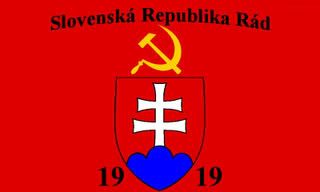What could have been
The story of Lt. Tuca
in the
Slovenská republika rád

Hello all! This is my second attempt at a narrative AAR. After the abandonment of my mediocre first attempt, I have to redeem my credit. Thus this AAR is born. This is the tale of the short-lived Slovak Soviet Republic, and how one man, Janko Tuca, was involved. I hope you, the reader, enjoy this piece! Remember, if you have any questions, comments, concerns, corrections, or cheers, please post them. Even if it is to just demand an update, I would appreciate it in the extreme. It's feedback from you that keeps me going! Now, onto the story!
Chapter One: Story Time..........................Can be found on Page One
Chapter Two: Múčnik...............................Can be found on Page One
Chapter Three: Expanded Cabinet..............Can be found on Page One
Chapter Four: Stockpiling.........................Can be found on Page Two
Chapter Five: Secret Weapon...................Can be found on Page Two
Chapter Six: Ruthenia.............................Can be found on Page Three
Chapter Seven: Budget Cuts....................Can be found on Page Three
Chapter Eight: The Fightin' Fitz................Can be found on Page Three
Chapter Nine: Greeks Bearing Gifts............Can be found on Page Four
Chapter Ten: Supply & Recruit.................Can be found on Page Four
Chapter Eleven: Training.........................Can be found on Page Four
Chapter Twelve: Finalizing.......................Can be found on Page Five
Chapter Thirteen: Bratislava....................Can be found on Page Five
Chapter Fourteen: Battle of Galanta..........Can be found on Page Five
Chapter Fifteen: Suprise..........................Can be found on Page Five
Chapter Sixteen: Disaster at Zavod...........Can be foud on Page Six
Chapter One: Story Time..........................Can be found on Page One
Chapter Two: Múčnik...............................Can be found on Page One
Chapter Three: Expanded Cabinet..............Can be found on Page One
Chapter Four: Stockpiling.........................Can be found on Page Two
Chapter Five: Secret Weapon...................Can be found on Page Two
Chapter Six: Ruthenia.............................Can be found on Page Three
Chapter Seven: Budget Cuts....................Can be found on Page Three
Chapter Eight: The Fightin' Fitz................Can be found on Page Three
Chapter Nine: Greeks Bearing Gifts............Can be found on Page Four
Chapter Ten: Supply & Recruit.................Can be found on Page Four
Chapter Eleven: Training.........................Can be found on Page Four
Chapter Twelve: Finalizing.......................Can be found on Page Five
Chapter Thirteen: Bratislava....................Can be found on Page Five
Chapter Fourteen: Battle of Galanta..........Can be found on Page Five
Chapter Fifteen: Suprise..........................Can be found on Page Five
Chapter Sixteen: Disaster at Zavod...........Can be foud on Page Six
Last edited:







